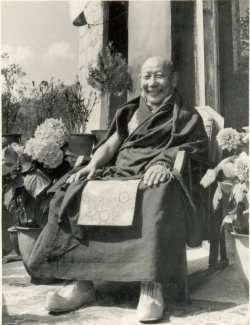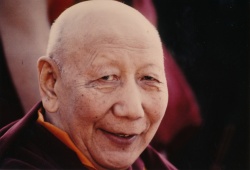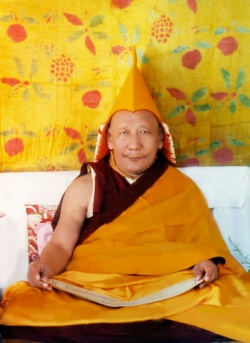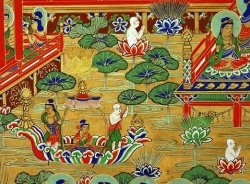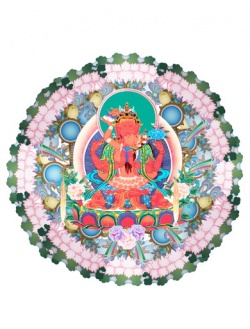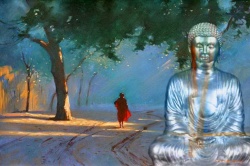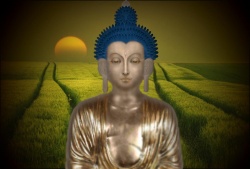The 6th Yongzin Ling Rinpoche (1903 – 1983)
==
The 6th Yongzin Ling Rinpoche (1903 – 1983)
Thupten Lungtok Namgyal Thinely, the 6th Yongzin Ling Rinpoche, was one of the most renowned and qualified masters of the 20th Century.
His students included masters from all four Tibetan Buddhist schools.
He was very learned and an accomplished writer, poet and expert on grammar.
In 1965 Ling Rinpoche was appointed the 97th Ganden Throne Holder and held the position as the head of the Gelug school for 19 years, longer than any other occupant of this throne.
Kyabje Yongzin Ling Rinpoche was born in 1903 not far from Lhasa in Kyisho, a place known as an abode of Cakrasamvara and his consort.
After only 12 years of study at Drepung Loseling Monastic University, he received a Geshe Lharampa degree at 21 years old.
Rinpoche served as disciplinarian and Abbot of Gyuto Tantric Monastery, before serving as the 14th Dalai Lama’s tutor.
He fled with His Holiness from Tibet in 1959 and lived in India for the remainder of his life.
Kyabje Yongzin Ling Rinpoche gave many public and private teachings and initiations throughout his life in Tibet, India, Europe and North America.
He passed away in Dharamsala, India at the age of 81.
Rinpoche’s consciousness remained in his body after he died in the clear light meditation on the mind of death for 13 days.
Qualities
The 6th Yongzin Ling Rinpoche had a reserved disposition and was known as a deep thinker and modest man, who hid his great qualities.
He approached everything he did with great effort and kindness.
Rinpoche was always content, relaxed and precise with everything he did, including giving very clear directions.
He did not have much interest in the gifts he received from disciples, but was always pleased when someone arrived with rare texts.
His Holiness the Dalai Lama remembers, “It was the nature of the precious tutor to be reserved.
He was not prone to sudden displays of happiness and sadness.
However, whenever he was aware of a living being in distress, such as hearing the cries of a dog being beaten, his eyes would well up and he would say, “Ah, poor thing!”
This was a sign that inside he possessed the quality of great compassion.” Tutor to the 14th Dalai Lama
Kyabje Yongzin Ling Rinpoche spent many years teaching His Holiness the 14th Dalai Lama.
As his Senior Tutor, Ling Rinpoche also assisted him with private highest yoga tantra meditation retreats.
His Holiness recollects, “He took primary responsibility for my care and upbringing.
In the beginning when I was six years old, I was really scared of him and learned to recognize the sound of his footsteps, which made my heart miss a beat.
But in the end I developed a very good relationship and he became my closest confidant up until his death in 1983.
He taught me reading, memorization of prayers and trained me from elementary logic through the complete study of the five great treatises.
He also gave me Bhikshu ordination, Bodhisattva vows, tantric initiations, as well as other branches of knowledge such as Sanskrit and poetry.”
Kyabje Yongzin Ling Rinpoche encouraged His Holiness to study all Buddhist traditions.
He gave him many key lineages, including the Lamrim Chenmo lineages and Kalachakra lineages.
Yongzin Ling Rinpoche was a root son and heart disciple of Khensur Dorje Chang Rinpoche, an important Kalachakra lineage holder.
He made a promise to him before he passed to ensure the Kalachakra tradition would be preserved and flourish in these degenerate times, since it’s a very powerful practice.
When Ling Rinpoche gave the Kalachakra initiation to the Dalai Lama in the Potala Palace, it was unusual he was very emotional while he conferred it.
Kyabje Yongzin Ling Rinpoche accompanied His Holiness when he traveled on a state visit to China in 1954 and to India in 1956 to commemorate the 2,500th anniversary of the Parinirvana of Sakyamuni Buddha.
When His Holiness was encouraged not to return to Tibet, Ling Rinpoche encouraged him to return.
The advice did not seem realistic at the time, but in the end was right.
His Holiness has stated he felt Ling Rinpoche was clairvoyant, even though he was humble and did not say how he knew.
Due to his high realization, the Dalai Lama believed he had to follow his instructions.
Yongzin Ling Rinpoche also traveled with His Holiness, when he escaped Tibet in 1959, and then settled in India with him.
First in Mussoorie then Dharamsala in 1960, which became the headquarters of the Tibetan Government-in-Exile.
Early Childhood
The 6th Ling Rinpoche, Yongzin Ling Dorje Chang Jetsun Thupten Lungtok Namgyal Trinley Palsangpo, was born in 1903 on the Yutok Drachen estate, which was owned by the 10th Dalai Lama’s family.
At the age of seven he was recognized by the 13th Dalai Lama, Thupten Gyatso, as the reincarnation of his tutor, the [[5th Yongzin] Ling Rinpoche]].
Many Dharma Protectors, including the Nechung Oracle and Gadong Oracle, gave clear and unmistakable prophesies about the reincarnation.
Kyabje Yongzin Ling Rinpoche was formally enthroned at Garpa Hermitage outside of Lhasa on the Dharma throne blessed by his previous incarnations.
The young boy lived there and at Ling Labrang in Lhasa until he was eight years old.
When asked how he played as a child, Ling Rinpoche explained, “I would often gaze out from the roof of my residence.
Other than that, I spent my time reading texts, biographies, and so on.” He also enjoyed making clay models and playing a stone-throwing game called Kings and Vassals.
The 6th Yongzin Ling Rinpoche entered Drepung Loseling Monastic University in Lhasa when he was nine years old and began studying the traditional five topics of the Geshe degree.
After qualifying for the final Geshe examination at the unusually young age of twenty-one, he received second position in 1924 among the Geshe Lharampas during the annual Lhasa Monlam Chenmo Fesitval.
His Holiness the 14th Dalai Lama has explained, “In these debates no matter how difficult the topic was, Ling Rinpoche responded at once with answers that would delight the wise, all the while with a smile that sat naturally on his face and in a manner that was both gentle and conscientious.
In this way, his reputation of being learned, of moral integrity and of a compassionate disposition grew extensively.”
Later that year Ling Rinpoche entered Gyuto Tantric Monastic University in Lhasa where he studied Tantra for one year, graduating in first position.
Throughout his life Kyabje Yongzin Ling Rinpoche continued to receive teachings on Sutra and Tantra.
He recited the name mantras of twenty-nine teachers, including His Holiness the 13th Dalai Lama, Phabongkha Rinpoche, Büldü Rinpoche, Regent Takdrak Rinpoche, Khangsar Rinpoche, and Chone Lama Rinpoche.
Teachings
The 6th Yongzin Ling Rinpoche gave his first public teaching in 1930, when he was 27 years old.
He taught a classic Lamrim text at Thosam Dargye Ling Mondastery in southern Tibet.
Since his lineage is regarded as an emanation of the Yamantaka deity, every year for over 40 years Rinpoche was requested to give this initiation and teachings on its generation and completion stages.
As a result, Yamāntaka initiations and teachings were conferred all over Tibet and India, as well as a few in the West.
Audiences would often number over 1,000.
Yongzin Ling Rinpoche and His Holiness the Dalai Lama’s junior tutor Trijang Rinpoche were invited to Switzerland in 1968 to consecrate the new Chokhor Ling Monastery in Zurich.
The two tutors travelled to Germany, England, and France in response to invitations and gave many teachings and initiations for over six months.
Yongzin Ling Rinpoche visited the West again in 1980 after many requests.
He taught for over four months in France, Italy and Switzerland before coming to the United States and Canada.
Rinpoche gave the first Yamantaka initiation conferred in New York City and composed a prayer for the Dharma to flourish in the West.
(Prayer)
Yongzin Ling Rinpoche’s last extensive public teaching was on the Lamrim Chenmo, the Great Treatise on the Graduated Path to Enlightenment.
It was given over three weeks in 1983 to an audience of 2,000 at Sera Monastery in Bylakuppe, South India.
His last public teaching was a five-day discourse in March 1983 on the Four Mindfulnesses.
It was given to a group of over 100 Indian, Western and Tibetan students and was followed by Avalokitesvara and Amitayus initiations to an audience of 1,000 at Tibet House, New Delhi, India.
Illness and Passing
The 6th Yongzin Ling Rinpoche suffered a serious stroke on September 5, 1983 in Dharamsala, India.
In spite of his grave illness and the severity of his condition, he was lighthearted and did not complain at all.
Many people from all over the world came to Dharamsala to offer prayers for his long life.
Rinpoche passed away a few months later on December 25th.
His consciousness remained in his body until January 7, 1984, while he meditated on the clear light nature of the mind of death.
None of the usual signs of death, such as odor or change in body color, occurred during the 13-day meditation.
His body remained fresh and luminous.
Shortly before his consciousness left the body, a rainbow occurred around the moon and very large snowflakes fell that looked like flowers.
His Holiness the 14th Dalai Lama composed a prayer for the swift return of his unmistaken reincarnation.
Because Kyabje Yongzin Ling Rinpoche was a unique and peerless lama, His Holiness asked that his remains be preserved through a long and traditional process of mummification.
An American sculptor, who was a student of Ling Rinpoche, created a sculptured likeness of him to cover the mummified body.
His Holiness consecrated the body and keeps the statue in his private temple in Dharamsala.
An eight-foot gold and copper Bodhi stupa, containing Rinpoche’s teeth, was also constructed and now stands in Drepung Loseling Monastery’s prayer hall.
